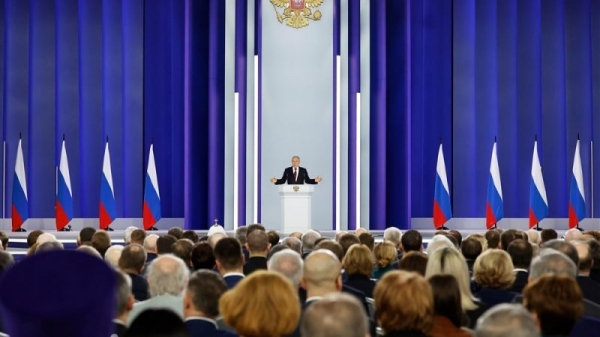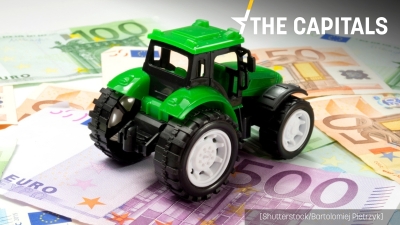Putin gives few hints about what’s next for Ukraine as he rallies Russian elites

Russian President Vladimir Putin gave no indication that he would end the war in Ukraine any time soon in his state-of-the-nation speech in Moscow on Tuesday (21 February), despite not having achieved any of his objectives nearly a year into the full-scale invasion.
Speaking before 1,500 members of Russia’s political and military elite, including both houses of parliament, Putin started by invoking a familiar narrative about why his invasion of Ukraine was, in his reading, forced upon Russia by the West.
As Friday’s anniversary of the invasion approaches, Putin again claimed that Ukraine and its Western allies had “started the war,” insisting he would not abandon the operation in Ukraine.
Over the past year, Russia’s military has suffered setback after setback, falling well short of its goal to take control of Ukraine, including the initial plan to capture the country’s capital Kyiv in three days.
Russia has sustained huge losses in the war but is expected to launch a new offensive in the spring. Putin, however, did not give an indication of what to expect next.
No foreign guests were invited to Putin’s speech, according to Dmitri Peskov, the Kremlin’s spokesman, TASS state news agency reported.
‘Hostage of the West’
Putin also accused Ukraine and the West of having planned to attack the Donbas region of Ukraine before the Russian invasion.
“They were the ones who started the war,” Putin claimed, adding that Russia was using force “in order to stop it” and that Moscow had done “everything we could to resolve the Donbas problem peacefully”.
He also reverted to calling Ukraine’s government a neo-Nazi regime.
“We are not fighting against the Ukrainian people,” Putin said. “They are the hostages of the Kyiv regime and its Western masters, who actually occupied this country in the political, military and economic sense.”
He once again invoked his familiar narrative of an ‘existential threat’ to Russia, claiming the West would “intend to transform a local conflict into a phase of global confrontation”.
“They also cannot fail to realise that it is impossible to defeat Russia on the battlefield. Therefore, they are conducting more and more aggressive information attacks against us,” Putin said.

Ukraine renews case for membership to visiting EU top officials
Ukraine’s leadership on Thursday (2 February) made an unequivocal plea for EU membership as the bloc’s top officials met their government counterparts in Kyiv in a first-of-its-kind gathering.
“I want to emphasise that (..) no country in the world has as many military bases abroad as the United States. There are hundreds of them (…) around the world,” Putin said.
Referring to the growing Western military support for Kyiv, Putin issued a veiled threat, stating that “the more long-range Western systems are being delivered to Ukraine, the farther we will be forced to move the threat from our borders.”
Spelling more bad news for global security, he announced that Russia will “halt its participation” in New START, the last major nuclear arms control agreement remaining between Russia and the United States.
The US State Department had already determined that Russia was not complying with the New START treaty, making the announcement at the end of January.
Donbas and economic reconstruction
The one-hour speech was less angry and forceful in tone than his September address, when he announced a draft of hundreds of thousands of civilians, and he seemed more focused on preparing Russia’s society and the military for tough times ahead.
He also sought to offer some hope as he vowed to ‘protect’ the people in the Donbas and promised support to the occupied territories of Donetsk, Luhansk, Zaphorizhia and Crimea.
“We have already begun and will continue to build up a large-scale programme for the socio-economic recovery and development of these new subjects of the Federation [ed.: territory annexed from Ukraine],” he said.

No alternative to Ukrainian victory, Zelenskyy tells Munich Security Conference
There is “no alternative to Ukrainian victory” as Kyiv presses on with efforts to fight back against invading Russia’s forces, Ukraine’s President Volodymyr Zelenskyy told the Munich Security Conference on Friday (17 January).
“We are talking about reviving enterprises and jobs in the ports of the Sea of Azov, which has again become an inland sea of Russia, and building new modern roads, as we did in Crimea”, he said, referring to the peninsula Russia invaded and annexed in 2014.
“This land, which is ours, will become prosperous again,” Putin declared, without specifying what those plans would specifically entail.
He also announced the creation of a “special state fund” to provide “personalised help to the families of dead fighters and the veterans of the ‘special military operation’.”
Sanctions impact on Russia’s economy
Putin claimed that economic sanctions imposed by the West have not crippled Russia as intended.
He said Russia’s economic output had declined 2.1% last year and added that this number was far below the initial predictions of how much Western sanctions would harm the country’s economy.
“They (Western countries) want to make the (Russian) people suffer (…) but their calculations did not materialise. The Russian economy and the management turned out to be much stronger than they thought,” he declared.
The figure he provided largely seems to be in the ballpark forecast by international financial institutions. According to the World Bank, the International Monetary Fund (IMF) and the Organisation for Economic Cooperation and Development (OECD), 2022 was a bad year for the Russian economy.
It is estimated that in 2022, Russia’s gross domestic product (GDP) dropped by at least 2.2% in the best-case scenario and by up to 3.9% in the worst-case scenario. Russia’s GDP is forecast to decline by 5.6% in the worst-case scenario (OECD) or by 3.3% according to the World Bank. The IMF expects slight growth in 2023 (0.3%).
Netherlands calls for EU sanctions enforcement headquarters
The Netherlands has put forward a proposal, supported by a dozen of EU member states, to establish a centralised EU sanctions watchdog to tackle mass circumvention of the bloc’s sanctions against Russia centrally from Brussels, according to a document seen by EURACTIV.
India and China have become the largest buyers of Russian oil, for example, as Western countries have restricted purchases and imposed sanctions – a move that, according to Putin, was only hurting themselves.
“Those imposing sanctions are punishing themselves – they have caused price hikes, job losses, an energy crisis and we hear them telling their own people that the Russians are to blame (…) Russia’s economy and administrative system have turned out to be much more resilient than the West thought,” he added.
Without providing evidence, Putin said that “many basic civilian sectors of the domestic economy not only have not shrunk but have actually increased production”.
He also lashed out at Russian businesspeople for using their profits for “yachts, estates and elite real estate” abroad, urging them to forget about whatever assets they may have lost to Western sanctions.
“None of the simple citizens of the country, believe me, was sorry for those who lost their capital in international banks.”
In what could be seen as a signal that Russia is serious about entering a new phase of self-reliance as it further cuts itself off from the West, Putin announced a series of domestic measures, from infrastructure plans and mortgage subsidies to changes in the country’s education system.



